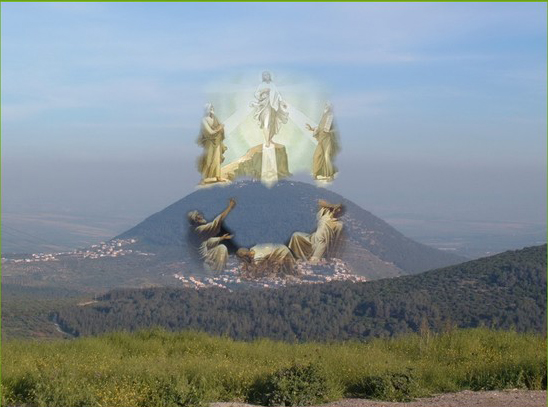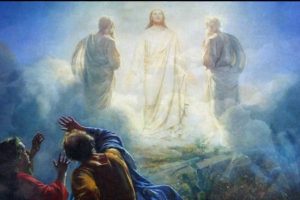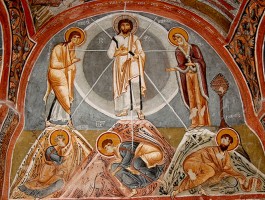My bishop recently shared the story of a young man whom he taught some years ago. He was Orthodox from Estonia. He grew up in the Soviet era and had come to hate all things Russian, including the Orthodox Church. Nevertheless, he saw an Orthodox procession in the streets of his city one year, a procession that included the Russian bishop (whom he also hated and believed to be a KGB agent). However, he saw the bishop surrounded by light. It was an experience that led him into the Orthodox faith. You might hate the man, and the Church as well. But the undeniable glory of God revealed what his hatred could not see.
My bishop’s point in sharing the story was not to exonerate the Russian Church from any wrong-doing, or cooperation with wrong-doing. Nor was it to exonerate the bishop involved and declare him holy. It was a story about the glory of God and its place and work despite our faults and failures. The 12 apostles cast out demons, healed the sick and cleansed lepers. We are nowhere told that Judas did none of those things. Doubtless, he did (which makes his betrayal all the greater).
There was a heresy in the early Church that denied the efficacy of the sacraments if they were performed by sinners. The debate was largely about those who, under the pressure of persecution, had in any way denied their faith or yielded to the requirements of the pagan state. It is an easy line of thought to maintain. If we are commanded to be holy, surely there are consequences for failure to observe the commandment. There are indeed consequences within the canons of the Church, but those consequences do not include an inefficacy of the sacraments.
The scandal of the Incarnation, God-becoming-man, is the seeming contradiction of the utterly transcendent God and the particularity and limits of human existence. It is a scandal whose errors run in two directions.
First, there is an assumption that God is so displeased with sin that He can have nothing to do with it, or that sin somehow nullifies the work of God. Second, there is an equally odious belief that human beings, in their observance of the commandments, are ever righteous enough to actually be compatible with true holiness. The first is an error about God, the second an error about human beings.
I’m always troubled to hear “there is no grace outside the Church.” I can’t fathom what such a statement means. Since the entire universe is sustained by the grace of God, I can only assume a sort of heresy of secularism by such a statement – the notion that anything can exist apart from God’s grace. For His own mysterious reasons, God even sustains the fallen angels by His grace. If it were not so, they would cease to exist. Only God has existence in and of Himself.
I can say “there is no grace outside the Church” only if I also say that everything in all of creation is inside the Church. In fact, I believe this to be true. The Church came into existence when God said, “Let there be light.” The sacraments do not make us to be what we are not, but reveal us to be what we truly are. Baptism and Chrismation are indeed required of those coming to Holy Communion, for they are fundamental realities in the medicine of immortality and the path of life God has given us. But the person who is Baptized does not somehow become other than what they are. They become more fully human, more truly what they were created to be. “The Holy Spirit completes that which is lacking,” it is said in our prayers.
There are boundaries which we describe as “the Church,” but this meaning is being used to specify that which is identified with the fullness of life in Christ. “Church”, in this usage, is “that which is reconciled.” St. Paul says that the end of all things is that they be “gathered together in one in Christ Jesus.” This is the Church, in the end.
Too frequently we speak of the Church in denominational terms, in which we speak of people who are reconciled in the fullness of Orthodoxy as though their “membership” constituted the whole of the Church. But St. Paul extends the Church to “all things.” Thus, the grass and the trees (and certainly the flour and the wine) are being gathered together into Christ. The Eucharist is not a gathering meant to exclude everything else. It is a gathering that represents everything else. “Thine own of Thine own we offer unto Thee.” What is there within all of creation that is not God’s own? Indeed, the members of the Church who gather, are themselves but the “first fruits” of the whole Adam.
And so we have the reality of glowing bishops who might be hated in Estonia (just as many other bishops might be hated elsewhere). The transfiguration (for such was the scene in that procession) of God’s creation is simply shocking to us. It is a manifestation of the love of God that ignores all scandal, except that which does not love. It is a transfiguration that gives light and that burns.
Many take a cold comfort in the fact that the transfiguring light of God burns some. However, it most often burns the eyes of those who judge the fitness of those transfigured. They become blind in this very manner.
The Transfiguration of Christ would generally be deemed to be free of scandal. He appeared on the Holy Mount with Moses and Elijah – how could the disciples not rejoice. But the text describes a scandal.
As He prayed, the appearance of His face was altered, and His robe became white and glistening. And behold, two men talked with Him, who were Moses and Elijah, who appeared in glory and spoke of His decease which He was about to accomplish at Jerusalem. (Luke 9:29-31)
Christ, in turn, spoke to the disciples about His decease which He was about to accomplish at Jerusalem, and Peter rebuked Him! The great scandal is always the scandal of the Cross. There is no path to true union with God that does not go through the Cross. This is true finally of all those who are transfigured as well as for all who hope to ever see a transfiguration.
It is of note that the Greek beneath this translation does not say that Christ was speaking with Moses and Elijah about His “decease.” The text calls it His “exodus.” It is not a casual word choice. His journey into death is the Great Exodus, the path through the Red Sea that drowns the mystical Pharaoh. It is the Lord’s Passover.
That Passover is the path to transfiguration. Moses himself, after the Passover, leads the people to a different holy mountain. There he received the Law written by the very finger of God. When he came down from the mountain his face was transfigured and the people were afraid to look at him – and asked him to please wear a veil.
In Christ the veil is removed, except for those who wear a veil covering their heart (2Cor. 3). But God is so merciful, He sometimes removes the veil so that angry young men on the streets of Estonia (which is everywhere) may see His glory and live.

















